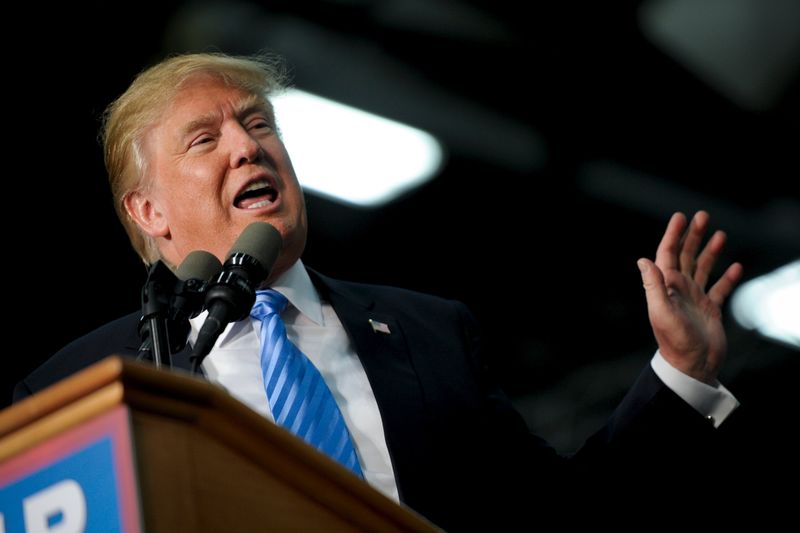By John Whitesides
WASHINGTON (Reuters) - U.S. Republican presidential front-runner Donald Trump on Thursday postponed his trip to Israel amid a controversy over his proposal to temporarily bar Muslims from entering the United States.
Trump, who has come under heavy criticism at home and abroad over his plan, said on Twitter (N:TWTR) that he would meet Israeli Prime Minister Benjamin Netanyahu "at a later date after I become president of the U.S."
Trump told Fox News he postponed the trip because he did not want to put pressure on Netanyahu, who faced demands from Israeli politicians to call off the planned Dec. 28 meeting. Netanyahu had rejected Trump's proposal on Muslims but said he would still meet with him.
"I also did it because I'm in the midst of a very powerful campaign that's going very well and it (the trip) was not that easy to do," said Trump, a real estate mogul and former reality TV star who leads opinion polls in the Republican nominating race for the November 2016 election.
The decision came just days after Trump provoked an international uproar by calling for Muslims, including would-be immigrants, students and tourists, to be blocked from entering the country after last week's shootings in California by two Muslims who authorities said were radicalised.
The uproar did not stop the New England Police Benevolent Association, a union that represents 5,000 law enforcement officers, from voting to endorse him on Thursday night. Appearing in New Hampshire, the crucial early primary state, Trump thanked the organization, which represents 1,000 New Hampshire officers, for their support.
White House spokesman Josh Earnest endorsed Trump's decision to postpone the trip to Israel and said "most people are relieved" that he would not be visiting such a sensitive region.
"The situation in Israel is particularly volatile, and so I think in this case his decision to reconsider that trip is a good outcome for all those involved," Earnest told reporters.
Trump's proposal has been condemned by an array of U.S. and global political leaders and human and civil rights groups, as well as many of Trump's Republican and Democratic rivals for the White House.
But so far his proposal does not seem to have affected his standing in the polls. A Reuters/Ipsos poll conducted this week, which includes responses from before and after Trump made his proposal on Monday, shows he still holds a commanding lead in the Republican race.
The Dec. 6-10 online poll showed Trump was supported by 35 percent of the 556 Republicans surveyed – roughly the same as in the previous five-day period and more than twice the level enjoyed by his nearest rivals, including retired neurosurgeon Ben Carson at 13 percent, and U.S. Senator Marco Rubio of Florida at 11 percent.
Reuters will release an expanded poll on Friday that is driven entirely by responses that came after Trump proposed a ban on Muslims.
GLOBAL REACTION
In Britain, a petition demanding that Trump be banned from visiting the United Kingdom had gained more than 450,000 signatures on Thursday and was still growing.
Trump responded on Twitter with a broadside at Britain, saying "many people in the U.K agree with me."
"The United Kingdom is trying hard to disguise their massive Muslim problem," he said. "Everybody is wise to what is happening, very sad! Be honest."
Peter Westmacott, the British ambassador to the United States, said in a response that "we are very proud of the Muslim community in the United Kingdom" and what extremist groups were doing did not have anything to do with Islam.
Part of the solution to the recent terrorist attacks "is to work with our Muslim communities, not to push them away with divisive or threatening language," he told reporters.
A Dubai real estate firm building a $6 billion golf complex with Trump, who has extensive business dealings in the Middle East, stripped the property of his name and image amid the uproar over the comments.
The firm, DAMAC Properties, initially said it would stand by Trump, even as another of the billionaire's Middle East partners, the Lifestyle chain of department stores, halted sales of his "Trump Home" line of lamps, mirrors and jewellery boxes in protest. A DAMAC spokesman declined to comment on why Trump's image was removed from a billboard outside the project site.
Defence Minister Manohar Parrikar of India, which has more than 170 million Muslims, likened the explosive potential of Trump's comments to "a nuclear bomb."

"In India, we have equal rights for everyone and we don't look towards communities with suspicion," he told a Washington news conference when asked about Trump. "Those who are radicalised, it's a different issue; we tackle them separately."